

Evolution of a national strategy for foreign language learning. Author: Jenny Willis © Jenny Willis, University of Surrey Abstract This paper discusses the potential advantage that bilinguals have over monolinguals and the attitudes of the English towards foreign language learning.

It summarises the findings of the Nuffield Enquiry and the Government's response, and suggests that attitudes need to change along with a political commitment to promote plurilingualism. This article was added to our website on 20/12/02 at which time all links were checked. Table of contents This paper was originally presented at the Setting the Agenda: Languages, Linguistics and Area Studies in Higher Education conference, 24-26 June 2002.
Introduction. The English Baccalaureate. The English Baccalaureate (EBacc) is a performance measure, not a qualification.
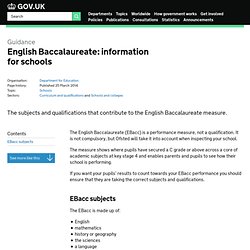
It is not compulsory, but Ofsted will take it into account when inspecting your school. The measure shows where pupils have secured a C grade or above across a core of academic subjects at key stage 4 and enables parents and pupils to see how their school is performing. If you want your pupils’ results to count towards your EBacc performance you should ensure that they are taking the correct subjects and qualifications. The flaw in Michael Gove's league tables.
League tables published on Wednesday revealed that more than 200 schools in England have failed to meet a new government target for GCSE results.
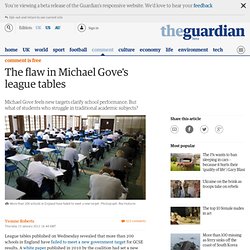
A white paper published in 2010 by the coalition had set a new target for schools: 35% of pupils achieving five GCSEs at grade A*-C, including English and maths, up from 30%. The new rankings also show that just 15.6% of pupils have achieved the English baccalaureate (bac), awarded to teenagers who achieve GCSEs in English, maths, a science, a foreign language and a humanity such as history or geography at grade C or above. From the government's perspective, this might well look like a success: having raised the bar, Michael Gove, the education secretary, may feel that he now has a better picture of how schools are performing. But does it also address the concerns of schools and pupils? In this respect, the usefulness of Gove's new scheme is less clear. In this country's best private schools, an ethos of high achievement is the norm. Michael Gove wants baccalaureate qualification for England.
The education secretary, Michael Gove, today announced plans to combat the decline in exam standards by proposing an English baccalaureate qualification to recognise the achievements of GCSE students who complete a broad course of studies.
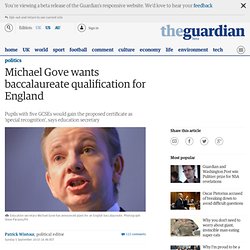
The "English bac" would not replace GCSEs, but would be a certificate to reward pupils who pass at least five of the exams, at grade C or above, including English, maths, one science, one foreign language and one humanity. "If you get five GCSEs in those areas, I think you should be entitled to special recognition," Gove said. The details will be set out in a white paper in the autumn, but Gove will flesh out some aspects in a speech tomorrow, seen by Labour as an attempt to divert attention from the fact that he is only able to announce 17 new free schools, state-funded institutions outside local authority control.
"One of the concerns about the English education system is that people's options are narrowed too early," he said. Language-learning to be compulsory for British children. Across mainland Europe this summer bars will be full of Brits abroad, speaking loud English accompanied by spirited gesticulations, unidentifiable European-ish lilts, or both of the above.
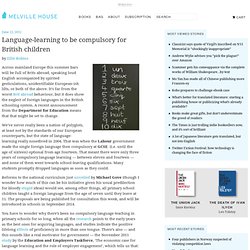
It’s far from the worst Brit abroad behaviour, but it does show the neglect of foreign languages in the British schooling system. A recent announcement from the Department for Education means that that might be set to change. We’ve never really been a nation of polyglots, at least not by the standards of our European counterparts, but the state of language-learning really nosedived in 2004. That was when the Labour government made the single foreign language then compulsory at GCSE (i.e. until the age of sixteen) optional from age fourteen. That meant there were only three years of compulsory language learning — between eleven and fourteen — and none of them went towards school-leaving qualifications. Ellie Robins is an editor at Melville House. Pupils in England worst for using languages independently. 21 June 2012Last updated at 11:09 ET Teenagers in England, France and Spain were among the least competent at languages Just 9% of 14 to 15-year-olds in England can use their first foreign language independently compared with 82% in Sweden, a study has found.
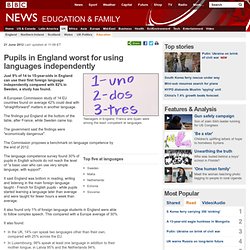
A European Commission study of 14 EU countries found on average 42% could deal with "straightforward" matters in another language. The findings put England at the bottom of the table, after France, while Sweden came top. The government said the findings were "economically dangerous". Foreign languages to be taught at school from age seven. All children are to be taught a foreign language – which could include Mandarin, Latin or Greek – from the age of seven under reforms to the national curriculum being unveiled by the education secretary, Michael Gove.
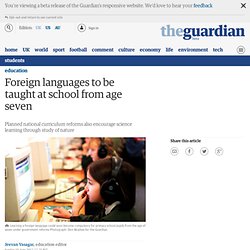
In other reforms, children will be encouraged to learn science by studying nature, and schools will be expected to place less emphasis on teaching scientific method. The introduction of compulsory language teaching in primary schools is intended to reverse the dramatic decline in takeup at GCSE. Pupils will need to be able to speak in sentences, with the appropriate pronunciation, and express simple ideas clearly in another language. They will be expected to develop an understanding of the basic grammar of the language, and be acquainted with songs and poetry. Ministers say that teaching should focus on making "substantial progress" in one language. Michael Gove To Make Foreign Language Learning Compulsory In Primary Schools.
Foreign languages to be compulsory from age seven. Nservative conference: Gove spells out next step on his agenda for schools. Free schools 'are not bastions of privilege in incredibly haute bourgeois areas.
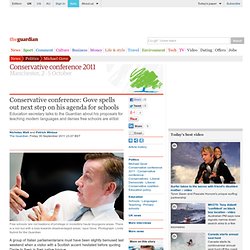
There is a mix but with a bias towards disadvantaged areas,' says Gove. Photograph: Linda Nylind for the Guardian A group of Italian parliamentarians must have been slightly bemused last weekend when a visitor with a Scottish accent hesitated before quoting Dante to them in their native tongue. "I am a very poor linguist but I am very fortunate in that my wife is a fluent speaker of French, Italian and Spanish," the education secretary, Michael Gove, says as he recalls his trip to Rome. Michael Gove proposes teaching foreign languages from age five. Michael Gove says there is a 'slam-dunk case for extending foreign language teaching to children aged five'.
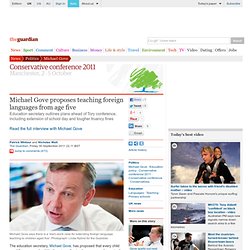
Photograph: Linda Nylind for the Guardian The education secretary, Michael Gove, has proposed that every child aged five or over should be learning a foreign language, and promised to "pull every lever", including encouraging longer school days, to make it happen. In a pre-Conservative conference interview, he says: "There is a slam-dunk case for extending foreign language teaching to children aged five. "Just as some people have taken a perverse pride in not understanding mathematics, so we have taken a perverse pride in the fact that we do not speak foreign languages, and we just need to speak louder in English.
It is literally the case that learning languages makes you smarter.